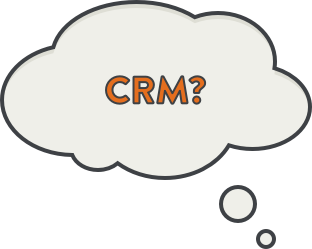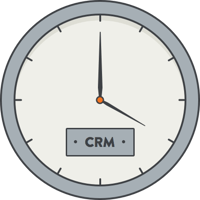
CRM stands for customer relationship management. As its name suggests, CRM software is a system for managing relationships with your customers.
For most businesses, their most valuable and important asset is their customers. In the early days at a lot of companies, the details about those customers -- who they are, how they’ve interacted with your organization -- are spread out in many different places. The CEO’s brain, a sales rep's inbox, the accountant’s stack of invoices.
As a business grows, it quickly becomes necessary to have one central place where all of this information lives.
Your team will be slowed down without quick answers to important questions. Who are our customers? How do we get in touch with them? How do they interact with our content? What does our pipeline of new business look like?
Your prospects and customers will feel the pain when your team isn’t on the same page. From their perspective, they have a relationship with one company, not a collection of different people and departments. Everyone on your team needs context about every customer’s needs, wants, and current state, so they can pick up the conversation where it left off.
These are the problems that CRM systems are designed to solve. With one central place to organize all the details of your leads and customers, it’s easy for everyone on your team to gain insight into the state of your business, and the status of every customer relationship.
Who should use a CRM?

Who uses CRM? The short answer is that any company that wants to maintain a relationship with their customers can benefit from using a CRM system. To get a little bit more specific, there are two groups of companies that often see the most benefit:
- B2B companies, which typically need to track leads and customers across long sales cycles and through upgrade paths (e.g., a software company, a recruiting firm)
- Considered-purchase B2C companies (e.g., a jeweler, a landscaping service, or a realtor)
That being said, there are a lot of companies out there who don’t fit the above two profiles, but still see value in using a CRM system. Another way to consider whether or not a CRM system can help your business is to think about the challenges that CRM systems aim to solve:
- Do you have a need for maintaining a central list of information on your leads and customers? Does this information live in several different places?
- Are your customers regularly interacting with multiple people on your team? How does everyone keep track of where the conversation with any one customer left off?
- Do you need a way to better understand the productivity of your sales team? Does your sales team have a structured process they follow?
If you answered yes to one or more of the above questions, chances are your business could benefit from a CRM system.
When is the right time to adopt a CRM?

If you’ve decided that a CRM system is probably in your company’s future, the next logical question is when. Many companies start small, storing their leads in an email tool, and their list of customers in a spreadsheet. This works fine for a while, but at a certain point, things start to break.
- It becomes tough to manage your data in a “flat” structure like a spreadsheet as it grows (e.g., visualizing the relationships between contacts, companies, sales opportunities, etc.)
- Jumping between the different places your data lives becomes cumbersome and slows your team down (e.g., log in to the email tool to find your contacts’ email addresses, your accounting tool to see the revenue they are associated with, a spreadsheet to find out what state they are located in, etc.)
- An employee leaving results in a loss of data (e.g., a sales rep leaves, drops all of the deals he was working on, leaving you no way to pick things up where he left off)
In short, the answer for most companies is pretty simple. While you may be able to get by for a while without a CRM system, adopting one sooner is often better than waiting until you feel the pain of an ad hoc solution you’ve outgrown.
But how much does a CRM cost? CRMs range in price; there’s not a one-size-fits-all answer. A few important things to keep in mind:
- Many CRMs charge per-user fees. In other words, one user would cost $50, two users $100, and so on.
- Some CRMs charge for additional data. This could come in a few different forms. Some CRMs charge on a per-record basis: you pay for each additional set of 1,000 (or 10,000, etc.) people in your database. Others charge for data storage in size. For example, you could store up to 5 gigabytes of data for free, then pay for each additional gigabyte.
- Still others charge for functionality. Pay $50/user/month for contact, company, and deal management; pay an additional $50 for the “Enterprise” product that includes lead scoring and reporting.
While the factors of CRM pricing can be complex, the good news is that the barriers to adopting CRM are lower than they ever have been before. A big part of the reason we made HubSpot CRM 100% free was so that people wouldn’t have to “take the plunge” on a long-term agreement with per-license fees, just in order to find out if you need a CRM. Keep your whole team using what they’re used to, and move a couple of reps.
The Evolution of CRM
What driving forces will define CRM’s future? Well, that depends on whom you ask. Most experts agree that businesses will naturally gravitate toward whatever CRM systems -- or alternatives to CRM -- actually drive business results.
At HubSpot, the future of CRM is something we think about a lot. Over the years, we’ve seen and heard from our customers, many of whom face the same challenges with their CRM systems:
- Most CRM systems are complicated, and using them properly requires a lot of manual work on the sales team (who usually don’t see equal value in return).
- Most CRM systems are empty databases that don’t have any insight into what customers are up to on your website, on social media, and in the many different places places and ways that customers interact with your company today.
With these realities in mind, in 2014 HubSpot launched HubSpot CRM. Designed to work seamlessly with the HubSpot marketing product, we went a step further to make it 100% free for anyone to try and use. No user limits, no storage limits, no time limits.
How CRM Fits into Growth
In a 2014 report from Gartner, research vice president Joanne Correia wrote, “CRM will be at the heart of digital initiatives in the coming years. This is one technology area that will get funding because digital business is critical for companies to remain competitive." Why? One word: growth. Put simply, companies are growing faster than ever. As they do, in both marketing and sales, there’s an abundance of new opportunities to reach and engage with potential customers, from new social channels to the rise of video marketing. While growth provides huge upside to companies of all sizes, these added touchpoints muddy the waters when it comes to effectively tracking and monitoring your company’s interactions with individual prospects. When organizations enter phases of rapid growth, it’s too easy for valuable leads to fall through the cracks. Not because marketing isn’t doing its job, or because sales isn't closing, but because both teams are overloaded with information.
Without a CRM system, as you grow, your marketing and sales staff will spend more and more time searching through emails and trying to connect with coworkers to get the most recent, accurate information on the status of leads. This might lead to missed or double-booked appointments, or a failure to follow through on vital tasks essential for nurturing leads through the sales funnel.
What’s more, each sales rep on your team might rely on a different sales process. In this scenario, communication with leads will lack consistency, or worse, prospects might even have to repeat the same information each time they connect with a representative from your company. Prospects may engage with your brand on social media channels, but because marketing isn’t clear on where the lead originated, marketers provide information out of sync with the prospect’s needs or demands.
CRM systems like HubSpot CRM solve the many challenges presented by growth. CRMs effectively organize contact, company, and sales opportunity information, as well as every interaction that takes place through the multitude of customer communication channels, including your website, email, phone calls, social media, and other channels. It’s more critical than ever for marketing and sales teams to function as a cohesive unit, and CRM systems are the perfect solution to help scaling organizations achieve that goal.
Perhaps most importantly, modern CRM solutions support the complex workflows of fast-growing sales teams. CRM systems keep your team on task and in sync, facilitating more effective use of time and eliminating many of the nuisance tasks that take up time without adding value (such as searching through email archives for the most recent communication with a lead, or tracking down the marketing representative who was last in contact with a key prospect for information needed to close the deal).
Refer to crm software at: https://amis.misa.vn/9691/phan-mem-crm-tot-nhat-cho-doanh-nghiep

Customizing CRM without a goal is like a building without a foundation.
Here are the top 8 challenges in CRM customization that organizations face and how to overcome them.https://www.vgrow.co/top-8-challenges-in-crm-customization-and-how-to-overcome-it/

CRM or Customer Relation Management system can streamline business processes and operations.
However, for effective CRM development, there are different technologies which are available.
Most of the CRM development services are using these technologies for their CRM solutions.
Let’s have a look at the best technologies that should be used for CRM development.


A Hubspot CRM is outstanding customer interaction approach which is being conducted by 70% of marketers all around the world at present.
CRM stands for Customer Relation Management and for the implementation of this approach, a CRM tool is always required.
Not only this, it creates analytical reports, emails, stores customer’s data & purchasing history and much more.
There are other CRM tools like Infusionsoft and Zoho that provides ultimate results like Hubspot CRM.
Let’s explore some interesting benefits that a marketer will get only with Hubspot CRM tool.
Deals With Tasks, Link Contacts And Deals


As technology makes continuous progress, conventional phones are being replaced by the better operating VoIP phone system.
To further add to its advantage, VoIP phone systems are being integrated with CRM software.
Find out how it’s beneficial to your business.
For more information please visit: https://www.vindaloovoip.com/blog/voip-integrating-crm-must-for-business-optimization/
























